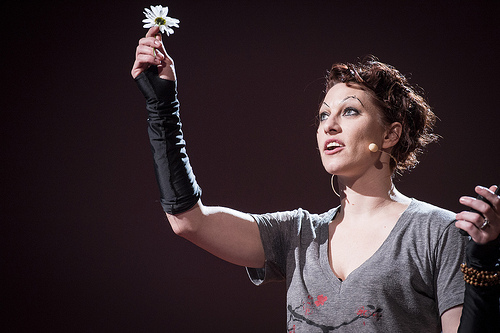Amanda Palmer on the Art of Asking and the Shared Dignity of Giving and Receiving
by Maria Popova
“When we really see each other, we want to help each other.”
 “It would be a terrible calamity,” Henry Miller wrote in his meditation on the beautiful osmosis between giving and receiving, “for the world if we eliminated the beggar. The beggar is just as important in the scheme of things as the giver. If begging were ever eliminated God help us if there should no longer be a need to appeal to some other human being, to make him give of his riches.” And yet, we live in a culture that perpetuates the false perception of a certain power dynamic between giver and receiver, and — worse yet — stigmatizes the very act of asking as undignified.
“It would be a terrible calamity,” Henry Miller wrote in his meditation on the beautiful osmosis between giving and receiving, “for the world if we eliminated the beggar. The beggar is just as important in the scheme of things as the giver. If begging were ever eliminated God help us if there should no longer be a need to appeal to some other human being, to make him give of his riches.” And yet, we live in a culture that perpetuates the false perception of a certain power dynamic between giver and receiver, and — worse yet — stigmatizes the very act of asking as undignified.
Last week, I had the pleasure of spending some time with the wonderfulAmanda Palmer who, besides being an extraordinarily talented musician, is also a fellow champion of open culture and believer in making good work freely available, trusting that those who find value in it will support it accordingly. Disillusioned with the questionable success standards of the music industry, she recently left her record label and set out to self-release her next album in what became the most heartily funded music project in the history of Kickstarter — but not without some harsh criticism by those too attached to the crumbling comforts of the Olden Ways. In this brave talk, easily my favorite TED talk of all time, Amanda invites us to reclaim the art of asking from the insecure grip of shame and celebrate it instead as the sublime surge of mutuality that it is:
Through the very act of asking people, I connected with them. And when you connect with them, people want to help you. It’s kind of counterintuitive for a lot of artists — they don’t want to ask for things. It’s not easy to ask. … Asking makes you vulnerable.[…]I don’t see these things as risks — I see them as trust. … But the perfect tools can’t help us if we can’t face each other, and give and receive fearlessly — but, more importantly, to ask without shame. … When we really see each other, we want to help each other. I think people have been obsessed with the wrong question, which is, ‘How do we make people pay for music?’ What if we started asking, ‘How do we letpeople pay for music?’
Given how close to home Amanda’s eloquent words strike, I chatted with her about what seems to be the greatest challenge to this cultural shift toward destigmatizing asking:
MP: As someone who’s been called an “internet pan-handler” for asking my community for support, I’m astounded by some people’s cynicism in failing to see the dignified mutuality in these exchanges. What can we do to shift the culture around them from pan-handling to daisy-handing?AP: Well…this is the problem with doing a 12-minute TED talk instead of writing a 220-page book. There’s a lot of simplification involved. The concept is more or less that when you trust people to help you, they often do, and artists have done this from the dawn of time. I’m sure the early-days minstrels were epically talented couchsurfers. Maybe there were cave-surfers way back in the day, who knows.I saw a comment on the TED website that basically said, “this model is bullshit… would you feel OK if Justin Bieber decided to crowdsource teenage girls to be his maids and clean his room, etc.,” and that got me thinking. First of all, it isn’t about the theoretical, it’s about what artists/people actually do. I doubt Justin Bieber would think it was a wise idea to let a giddy little fan into his pad and clean up his stuff, it’d be a huge pain in this ass for him and his privacy, etc., since he’s a celebrity and all he’d need is that one fan tweeting a picture of the joint and used condom by his bedside and he’d have a PR nightmare on his hands.And the Bieber example is odd, because it involves children, but let’s say the example was, I don’t know, Ozzy Osbourne. Let’s say Ozzy puts out a call for crowdsourced maids. If an adult raises his or her hand and says, “Hell yes!!! I’m happy to spend X time being Ozzy’s maid, this’ll be interesting,” isn’t that a fair exchange between two consenting adults? Don’t people do weird shit all the time for each other, for free, just for the experience? The story? The feeling?What if we replaced Ozzy with … I don’t know … the Dalai Llama? Would we judge it differently? A lot of young monks give up their possessions, go study with a master, and do their master’s dishes … and we think of this in a kind of gentle-hearted karate-kid sort of romanticism. …The idea is to let adults make their own rules, their own exchanges, their own decisions. We all value different things and experiences in different ways — and we can get very creative about it, and about the ways we help each other.
To partake in the architecture of this new paradigm and revel in the two-way street of this glorious mutuality, support Amanda’s music and ethos on her site, where you can download her fantastic new album — for free or for however much you’d like — and go see one of her shows if you get a chance. For more of her spirit of fierce openness, follow her Twitter.
Photograph: James Duncan Davidson for TED

No comments:
Post a Comment